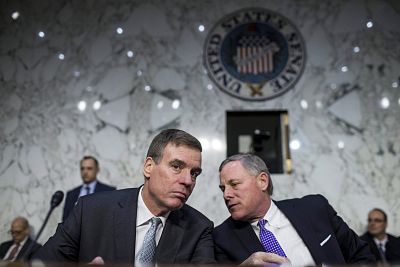Obama's national security adviser, Susan Rice, told staff to hold off on any cyber retaliation options against Russia, the report said.
The Obama administration was caught off guard by Russia's interference in the 2016 election and did not have options at the ready to retaliate over the meddling, resulting in a constrained and flawed response, according to a new report from the Senate Intelligence Committee issued Thursday.
The partially redacted report also said President Barack Obama's national security adviser, Susan Rice, told her staff to put on hold contingency plans for possible cyber retaliation against Russia over the interference. The administration'sdecision to stand down had been previously reported.
The 54-page report is the third installment of a five-part series by the committee examining the scale of Russia's interference in the 2016 election and follows three years of extensive investigation.
The report said the Obama administration was understandably concerned that a sharp public response to Russia's meddling could have been interpreted in the U.S. as an attempt to tip the scales in favor of Democratic presidential nominee Hillary Clinton. But the report also said the White House — faced with an unprecedented challenge — lacked a clear set of options and that its failure to share information inside the administration hampered its ability to respond.
The administration's decision to treat cyber and geopolitical aspects of Russia's effort as separate issues also may have prevented officials from grasping the full scale of the threat from Moscow, the report said.
"The Committee found that the U.S. Government was not well-postured to counter Russian election interference activity with a full range of readily-available policy options," the report said in its findings. "One aspect of the administration's response — high-level warnings of potential retaliation — may or may not have tempered Moscow's activity."
The Republican chairman of the committee, Sen. Richard Burr of North Carolina, said the Obama White House "struggled to determine the appropriate response."
"Frozen by 'paralysis of analysis,' hamstrung by constraints both real and perceived, Obama officials debated courses of action without truly taking one," Burr said in a statement.
Sen. Mark Warner of Virginia, the ranking Democrat on the committee, said there "were many flaws with the U.S. response to the 2016 attack, but it's worth noting that many of those were due to problems with our own system — problems that can and should be corrected."
Warner said he was concerned that the country's deeply polarized politics made it difficult for the Obama team to respond in 2016 and could hamstring future administrations.
"All Americans, particularly those of us in government and public office, must work together to push back on foreign interference in our elections without regard for partisan advantage," Warner said.
After Russia's hack of the Democratic National Committee was discovered, Michael Daniel, the cyber security coordinator on Obama's National Security Council staff, helped draw up a list of possible cyber retaliation options to push back against Moscow, according to the report.
But senior officials were concerned the list of options had been distributed too widely inside the government, and that they only wanted to see "defensive" options on the table, the report said.
"I think there was a concern on the part of the senior level at the White House that some of the discussions had gotten frankly over-broad, and too many people had been brought into those discussions, and so part of that work was to restrict, shrink down the number of people that were involved in developing the response options," Daniel told the committee.
"I would say essentially we were told to focus on the defensive work and that we basically put other activities on hold," Daniel said, according to the report.
The administration ended up focusing mainly on "protecting election infrastructure and castigating the Russians prior to the election, saving punitive responses until after Moscow's ability to affect the 2016 election had passed," the report stated.
The report corroborated previous accounts that Senate Majority Leader Mitch McConnell opposed making a bipartisan statement about Russian interference before the election.
At a September 2016 briefing with members of Congress, McConnell and other Republicans "resisted the administration request that a bipartisan statement be made regarding Russia being responsible for interference activities," the report stated.
Lisa Monaco, then counter-terrorism adviser to President Obama, told the committee that McConnell told officials "your security people should be careful that you're not getting used."
She interpreted his comment as suggesting that the intelligence regarding Russian efforts to interfere in the 2016 elections "was being inflated or used for partisan ends," the report said.












